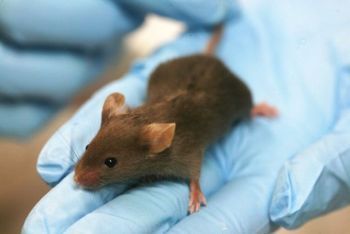
Publisher:
Bonnie King
CONTACT:
Newsroom@Salem-news.com
Advertising:
Adsales@Salem-news.com

~Truth~
~Justice~
~Peace~
TJP
Feb-21-2012 16:13

 TweetFollow @OregonNews
TweetFollow @OregonNews
OHSU Researchers Say Rodent Research Offers Clue in Combating Flu
Salem-News.comMice bred to more closely resemble a genetic variation in humans help target an annual outbreak: the flu.
 Lab mouse - photo: ohsu.edu |
(PORTLAND, OR) - As part of a national collaboration, Oregon Health & Science University researchers are studying specially bred mice that are more like humans than ever before when it comes to genetic variation. Through these mice, the researchers hope to better understand and treat an infectious disease that plagues us year in and year out: the flu.
The scientists aim to determine why some people suffer serious illness and even death when infected with influenza while others suffer only mild to moderate symptoms. The research is published in a special joint issue of the journals Genetics and G3: Genes, Genomes, Genetics, both publications of the Genetics Society of America.
The research was conducted within the Pacific Northwest Regional Center for Excellence (PNWRCE) for Biodefense and Emerging Infectious Diseases, a consortium of investigators with extensive expertise, and basic and translational research capacity directed at a broad range of pathogens. The cooperative effort has the goal of combating emerging or re-emerging infectious diseases that pose a serious threat to human health. The director of the PNWRCE is Jay Nelson, Ph.D., the founder and director of the Vaccine and Gene Therapy Institute at OHSU.
For decades, mice have played a key role in developing new treatments from the discovery of penicillin to the creation of polio vaccine. Because mice studied in labs are bred in a controlled manner, they are often genetically identical. Most of the time this is beneficial. The lack of genetic variation increases reproducibility and can help researchers more quickly determine a contributing factor to disease, but research on more complex diseases calls for mice to be more like humans who are genetically diverse. That's where this research project differs from many others.
The researchers are studying mice from the Collaborative Cross Program. Because these mice more closely reflect the genetic variation of humans, they may be the key to understanding some of today's most common, and most complex, diseases.In this case, the specially bred mice were used to study the varying immune response to the annual influenza outbreak.
In this research project, the scientists studied 44 groups of flu-infected mice that varied genetically. Due to this variation, the mouse reaction to influenza varied greatly, just as it does in the human population. The researchers then noted genetic differences that may have caused the variety of disease responses. Their ongoing work is to more clearly identify which genes cause these differences.
"Each year, annual influenza epidemics result in about 3 million to 5 million cases of severe illness," explained Shannon McWeeney, Ph.D., an associate professor of biostatistics and bioinformatics and head of the Division of Bioinformatics and Computational Biology at OHSU.
"We see a broad spectrum of response to influenza infection ranging from patients with minor symptoms to the estimated 250,000 to 500,000 deaths worldwide." "We want to understand what genetic factors influence this wide-ranging response. More importantly, with a better understanding of the genetic influence of disease response, we believe we can help in the development of better, safer vaccines that can target the most vulnerable population: the sick, elderly and young. We also want to determine if the genetic factors that impact flu response also play a role in the varying responses to other diseases. If so, this new research method could have a much broader impact," McWeeney said.
The National Institute of Allergy and Infectious Diseases funded this research (5U54AI081680).
Source: Press release from OHSU
About OHSU
Oregon Health & Science University is the state's only health and research university and its only academic health center. As Portland's largest employer, OHSU's size contributes to its ability to provide many services and community support activities not found anywhere else in the state. OHSU serves patients from every corner of the state and is a conduit for learning for more than 4,300 students and trainees. OHSU is the source of more than 200 community outreach programs that bring health and education services to each county in the state.
 |
 |
 |
 |
 |
Articles for February 20, 2012 | Articles for February 21, 2012 | Articles for February 22, 2012
Quick Links
DINING
Willamette UniversityGoudy Commons Cafe
Dine on the Queen
Willamette Queen Sternwheeler
MUST SEE SALEM
Oregon Capitol ToursCapitol History Gateway
Willamette River Ride
Willamette Queen Sternwheeler
Historic Home Tours:
Deepwood Museum
The Bush House
Gaiety Hollow Garden
AUCTIONS - APPRAISALS
Auction Masters & AppraisalsCONSTRUCTION SERVICES
Roofing and ContractingSheridan, Ore.
ONLINE SHOPPING
Special Occasion DressesAdvertise with Salem-News
Contact:AdSales@Salem-News.com

googlec507860f6901db00.html



Terms of Service | Privacy Policy
All comments and messages are approved by people and self promotional links or unacceptable comments are denied.
[Return to Top]
©2025 Salem-News.com. All opinions expressed in this article are those of the author and do not necessarily reflect those of Salem-News.com.